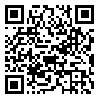1. Allen JG, Fonagy P. The handbook of mentalization-based treatment. Hoboken, New Jersey: John Wiley & Sons; 2006. [
DOI:10.1002/9780470712986]
2. Atella LD, DiPietro JA, Smith BA, St James-Roberts I. More than meets the eye: Parental and infant contributors to maternal and paternal reports of early infant difficultness. Parenting: Science and Practice. 2003; 3(4):265-84. doi: 10.1207/s15327922par0304_1 [
DOI:10.1207/s15327922par0304_1]
3. Van Bakel HJ, Riksen-Walraven JM. Parenting and development of one-year-olds: links with parental, contextual, and child characteristics. Child Development. 2002; 73(1):256-73. doi: 10.1111/1467-8624.00404 [
DOI:10.1111/1467-8624.00404]
4. Blandon AY, Calkins SD, Keane SP, O'brien M. Contributions of child's physiology and maternal behavior to children's trajectories of temperamental reactivity. Developmental Psychology. 2010; 46(5):1089-1102. doi: 10.1037/a0020678 [
DOI:10.1037/a0020678]
5. Belsky J. The determinants of parenting: A process model. Child Development. 1984; 55(1):83-96. doi: 10.2307/1129836 [
DOI:10.2307/1129836]
6. Carpenter JL, Mendez J. Adaptive and challenged parenting among African American mothers: Parenting profiles relate to head start children's aggression and hyperactivity. Early Education & Development. 2013; 24(2):233-52. doi: 10.1080/10409289.2013.749762 [
DOI:10.1080/10409289.2013.749762]
7. Chang H, Olson SL, Sameroff AJ, Sexton HR. Child effortful control as a mediator of parenting practices on externalizing behavior: Evidence for a sex-differentiated pathway across the transition from preschool to school. Journal of Abnormal Child Psychology. 2010; 39(1):71-81. doi: 10.1007/s10802-010-9437-7 [
DOI:10.1007/s10802-010-9437-7]
8. Flouri E. Fathering and child outcomes. Hoboken, New Jersey: John Wiley & Sons; 2005. [
DOI:10.1002/9780470713228]
9. Kiff CJ, Lengua LJ, Zalewski M. Nature and nurturing: Parenting in the context of child temperament. Clinical Child and Family Psychology Review. 2011; 14(3):251-301. doi: 10.1007/s10567-011-0093-4 [
DOI:10.1007/s10567-011-0093-4]
10. Madigan S, Atkinson L, Laurin K, Benoit D. Attachment and internalizing behavior in early childhood: A meta-analysis. Developmental Psychology. 2013; 49(4):672-89. doi: 10.1037/a0028793 [
DOI:10.1037/a0028793]
11. Krishnakumar A, Buehler C. Interparental conflict and parenting behaviors: A meta-analytic review. Family Relations. 2000; 49(1):25-44. doi: 10.1111/j.1741-3729.2000.00025.x [
DOI:10.1111/j.1741-3729.2000.00025.x]
12. Fowers BJ, Olson DH. Enrich Marital Inventory: A discriminant validity and cross-validation assessment. Journal of Marital and Family Therapy. 1989; 15(1):65-79. doi: 10.1111/j.1752-0606.1989.tb00777.x [
DOI:10.1111/j.1752-0606.1989.tb00777.x]
13. Rehman RR, Waheed A. Work-family conflict and organizational commitment: Study of faculty members in Pakistani universities. Pakistan Journal of Social and Clinical Psychology. 2012; 10(1):23-6.
14. Gross JJ, John OP. Individual differences in two emotion regulation processes: Implications for affect, relationships, and well-being. Journal of Personality and Social Psychology. 2003; 85(2):348-62. doi: 10.1037/0022-3514.85.2.348 [
DOI:10.1037/0022-3514.85.2.348]
15. Parent J, Forehand R, Merchant MJ, Edwards MC, Conners-Burrow NA, Long N, et al. The relation of harsh and permissive discipline with child disruptive behaviors: Does child gender make a difference in an at-risk sample? Journal of Family Violence. 2011; 26(7):527-33. doi: 10.1007/s10896-011-9388-y [
DOI:10.1007/s10896-011-9388-y]
16. Woolfson L, Grant E. Authoritative parenting and parental stress in parents of pre-school and older children with developmental disabilities. Child: Care, Health and Development. 2006; 32(2):177-84. doi: 10.1111/j.1365-2214.2006.00603.x [
DOI:10.1111/j.1365-2214.2006.00603.x]
17. Luster T, Okagaki L. Parenting: An ecological perspective. Abingdon: Routledge; 2006.
18. Grusec JE, Hastings PD. Handbook of socialization: Theory and research. New York: Guilford Publications; 2008.
19. Jenkins JM, Rasbash J, O'connor TG. The role of the shared family context in differential parenting. Developmental Psychology. 2003; 39(1):99-113. doi: 10.1037/0012-1649.39.1.99 [
DOI:10.1037/0012-1649.39.1.99]
20. Bates JE, Pettit GS. Temperament, parenting, and socialization. In: Grusec JE, Hastings PD, editor. Handbook of Socialization: Theory and Research. New York: Guilford Press; 2007.
21. Clark LA, Kochanska G, Ready R. Mothers' personality and its interaction with child temperament as predictors of parenting behavior. Journal of Personality and Social Psychology. 2000; 79(2):274-85. doi: 10.1037//0022-3514.79.2.274 [
DOI:10.1037//0022-3514.79.2.274]








